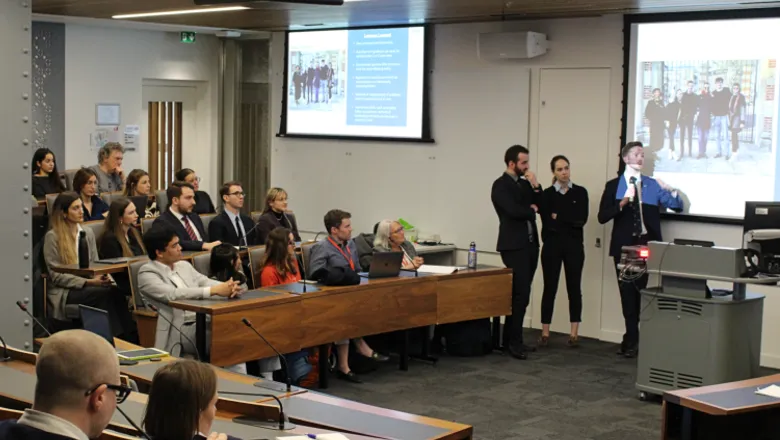"Each team starts off with a problem statement outlining the military sponsor's initial understanding of the problem. It's always fascinating to see how understanding the problem evolves— almost always in unexpected ways — and the evidence base the students can provide for their new understanding of the problem and their proposed solution"
Dr Susan Martin
30 March 2023
War Studies students develop solutions to address national security challenges
As part of the 'Hacking Defence Problems' module, MA students worked with the Ministry of Defence in addressing emerging threats and security challenges, covering policy, economics, technology, and national security.

Five groups of postgraduate students developed projects focused on addressing real-world problems proposed by UK government sponsors, which included airframe corrosion, the lack of people positioned in most Allied countries capable of conducting significant research and development, ineffective resource investment in the Air Command, collaboration on defence capability between the UK's Arctic Allies, and closing gaps in the Royal Navy.
Dr Susan Martin, Senior Lecturer in the Department of War Studies and one of the module convenors, highlighted the module as an opportunity for students to work on problems and gain experience in high-demand professions to start their careers in national security and defence.
One of the teams explored various aspects of communication issues related to how the problem of corrosion of helicopters used for submarine hunting is interpreted and presented. After conducting interviews and field trips, students identified four main solutions to enhance the helicopter's safety, such as introducing digital tools to improve the current data collection system, conducting checks more frequently, increasing transparency and making information readily available to stakeholders, and allocating additional resources.
Another team was focused on enhancing international cooperation in defence research and development, maximising relations with British Government allies and improving the prioritisation process and collaboration in those countries. Students defined different solutions to address the problem, including the creation of a team of envoys with specific areas of expertise to foster community collaboration and communication, as well as addressing cultural differences and time zone difficulties. They also suggested capitalising on the expertise of their network of allies and partners in regions such as the Indo-Pacific to strengthen allied capability for increased research and development.
Professor Matthew Moran, also a module convenor, highlights that the module teaches students valuable skills for solving defence-related problems and navigating government bureaucracy.
"Hacking Defence Problems is a challenging and rewarding experience for our students. The learning curve is steep - as well as grappling with a new methodology, they learn to conduct interviews, engage with government sponsors and navigate the complex bureaucracy of government, among other things. But the module leaves the students with skills that employers really value. I've been hugely impressed with the progress of the students this year, as they have come up with some really valuable insights on the problems facing their sponsors"
Matthew Moran
The module is based on the Mission Driven Entrepreneurship programme' Hacking for Defense® (H4D)' initially developed at Stanford University, combining experiences from Silicon Valley startups and battlefields. In the UK, the module is sponsored by the Ministry of Defence under the name 'Hacking for the Ministry of Defence', and the first one was launched in 2019 at King's.
For more information about the 'Hacking Defence Problems' module, visit www.kcl.ac.uk/warstudies/study-with-us/HacingDefenceProblems


